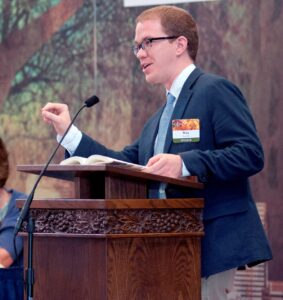Sometimes a court opinion is more than just a court opinion.
Justice Anthony Kennedy’s 26-page decision Wednesday (June 26) striking down a federal ban on same-sex marriages offers a window into Americans’ rapidly shifting views of same-sex relationships — a shift that increasingly relies on matters of law and fairness, not moral or religious views.
At the same time, Justice Antonin Scalia’s biting 26-page dissent in United States v. Windsor reflects a set of cultural, religious and social arguments that are losing ground in the court of public opinion and now, in the highest court of the land.
In the 17 years since Congress passed the Defense of Marriage Act, many Americans have gained “a new perspective, a new insight” on the meaning of marriage, Kennedy said. As a result, gay marriage is now legal in 12 states and the District of Columbia.
Kennedy said large swaths of American society had concluded that not allowing gay couples to wed is an “unjust exclusion.” He used a striking string of words to describe DOMA’s impact on gay families: Disparage. Degrade. Demean.
Allowing gay marriage, he said, is a “far-reaching legal acknowledgment of the intimate relationship between two people, a relationship deemed by the State worthy of dignity in the community equal with all other marriages.
“It reflects both the community’s considered perspective on the historical roots of the institution of marriage and its evolving understanding of the meaning of equality.”
A decade ago, it would have been near inconceivable to imagine the nation’s highest court referring to the “dignity” of gay marriage. But things have changed — remarkably so. In 2003, at the time of Lawrence v. Texas, the court’s last major gay rights case, support for gay marriage hovered around 32 percent; today, that figure is 51 percent.
Why the shift? For one, older generations that are the most opposed are giving way to younger Americans that are far more supportive. Gays and lesbians are coming out younger and more often, and openly gay characters anchor popular shows like “Glee” and “Modern Family.”
In 2003, gay marriage didn’t exist and the Episcopal Church was shell-shocked by the election of an openly gay bishop. On Wednesday, the bells of Washington National Cathedral pealed in celebration and last month’s election of the first openly gay Lutheran bishop was met with mostly shrugs.
A recent Gallup Poll found a 19-point swing on the “moral acceptability” of gay and lesbian relations since 2001 — the largest shift on any social issue. As Gallup put it, “U.S. acceptance of gay/lesbian relations is the new normal.”
All that has fueled a larger reassessment of marriage that undergirds Kennedy’s opinion for the 5-4 majority: “DOMA instructs … all persons with whom same-sex couples interact, including their own children, that their marriage is less worthy than the marriages of others,” he wrote.
Kennedy continued: There is no purpose served by DOMA other than to “disparage and to injure those whom the State, by its marriage laws, sought to protect in personhood and dignity.”
(The court, by a different 5-4 majority, essentially overturned California’s Proposition 8 that ended gay marriage in the state, but the court’s decision in that case centered around questions of legal standing and procedure, not the merits of gay marriage itself.)
Scalia’s arguments, too, are illuminating, but more for the fact that they once were considered mainstream and are now losing ground.
Scalia’s dissent echoed the arguments made by defenders of traditional marriage. DOMA supporters did not act “with hateful hearts,” he said, and Americans who oppose same-sex marriage are neither “mean-spirited” nor “unhinged members of a wild-eyed lynch mob.”
Scalia appealed to tradition, saying he and other conservatives are simply looking to enshrine an understanding of marriage that was “unquestioned in our society for most of its existence — indeed, had been unquestioned in virtually all societies for virtually all of human history.”
“To defend traditional marriage is not to condemn, demean or humiliate those who would prefer other arrangements,” he wrote.
Scalia also pushed back against the idea that civil marriage for gay couples is a matter of civil justice and basic fairness. “In the majority’s telling, this story is black-and-white: Hate your neighbor or come along with us. The truth is more complicated.”
That’s not to say that Scalia and his ideological allies on the court have reached the end of the marriage battle — at least not yet. In fact, Scalia’s been right on this score before.
In 2003, a similar 5-4 majority led by Kennedy struck down anti-sodomy laws as unconstitutional in Lawrence v. Texas. Scalia wrote that there was little reason to stop the court from eventually allowing gay marriage.
On Wednesday, Scalia warned that “as far as this Court is concerned, no one should be fooled; it is just a matter of listening and waiting for the other shoe” to drop and force states to accept gay marriage from other states or Washington.
Section 2 of DOMA — which wasn’t part of Wednesday’s case — allows states not to recognize gay marriages performed in other states. That doesn’t change, at least for now.
Wednesday’s warning was issued June 26, 2013 — exactly 10 years to the day since Scalia’s warning in Lawrence. On this score, Scalia actually may have popular opinion on his side: 72 percent of Americans say legal recognition of same-sex marriage is “inevitable.”
–June 26, 2013








Leave a Reply
You must be logged in to post a comment.